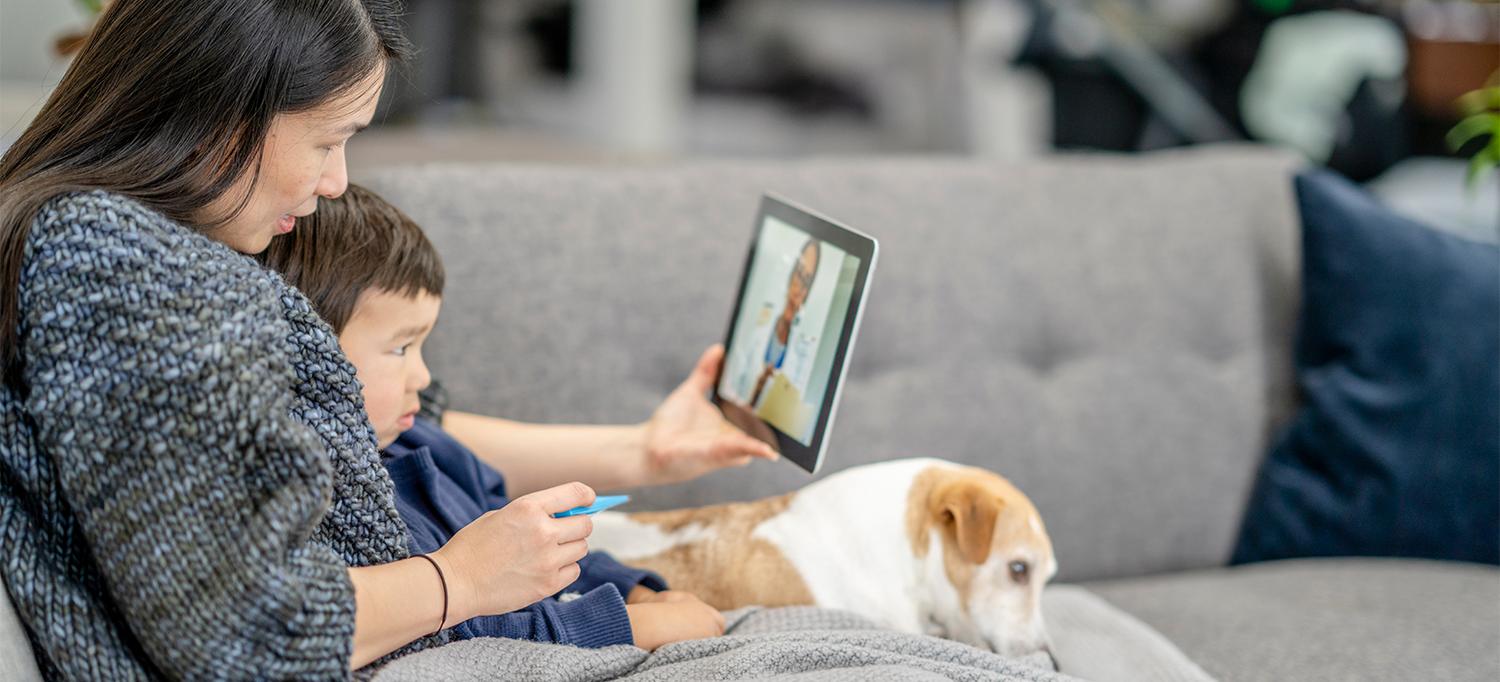
Photo: FatCamera/Getty
This article is part of Rashes, Sunburns, Bug Bites & More: Our Pediatric Experts Offer Tips for Helping Kids Weather the Summer.
When your child is experiencing a true medical emergency, the answer is easy: call 911 or visit your nearest emergency department. But when it comes to caring for a child’s minor bruises, sprains, and infections, the pathway isn’t always clear-cut. In these situations, the medical team at NYU Langone’s Virtual Urgent Care can provide diagnosis and treatment info for children age 5 and older without the need for a hospital visit.
But when exactly is a virtual visit appropriate and useful? Our expert has advice on how and when to use Virtual Urgent Care and make it work for you.
When Pictures Tell the Story
A video call gives medical providers a lot of information. “Just seeing what a kid looks like, you can get a sense of how sick they are or how serious the injury is,” says Karen N. Goodman, MD, a pediatric emergency medicine doctor at NYU Langone. “We can help you know what can be treated at home and what needs more intervention.”
A rash is a good example of a condition that a care provider can evaluate on camera. Seeing a child’s irritated skin via a video visit or in pictures you’ve uploaded to NYU Langone Health MyChart, our patient portal, can help narrow the diagnosis and determine the course of treatment. The same is true for cuts or other wounds that might or might not need stitches. Doctors can also tell a lot about a feverish child just by seeing them on screen. “A kid who can barely stay awake or is too tired or too weak to get out of bed and walk to the bathroom by themselves is concerning to me,” says Dr. Goodman.
When Parents Can Do a Physical Exam
A care provider can’t physically examine your child during a virtual visit, but a parent or guardian can. “A virtual visit for children is a partnership with the guardian or parent to help us get the exam,” Dr. Goodman explains. She uses the opportunity to walk parents through the particulars of assessing a child’s condition. For example, “I will show you how to do an abdominal exam, and then watch how your child responds, to help rule out things like appendicitis.”
Dr. Goodman also teaches parents how to take vital signs, which are basic body measurements such as temperature and pulse. “We can work with parents to figure out how to get a heart rate,” she says. Some families have pulse oximeters at home, so a parent can use one to check the child’s blood oxygen level.
Your Pediatrician’s Office Is Closed. Now What?
A swollen ankle, a bump on the head—when these and other injuries happen outside of typical pediatric office hours, a parent is often left in a quandary. You want to know, “Should this child be seen right away? Should I worry?” “Sometimes parents just want a gut check,” Dr. Goodman explains, and Virtual Urgent Care is a good way to get one.
A child who is acting normally and appears well to the care provider during a video visit can provide some level of comfort and reassurance. “Just having someone look at the child and talk through what to do and what things to worry about can be helpful,” says Dr. Goodman.
For non-emergencies, our Virtual Urgent Care service providers can see a child 5 and older, accompanied by their parent or guardian, on a video visit.
And if an issue arises during the virtual visit, our experts can provide guidance. “If we think a child needs an X-ray immediately, we can tell them where to get that done,” she adds. After the visit, a care summary is sent to your child’s NYU Langone pediatrician or care team so that everyone is on the same page—providing seamless, coordinated care for your child.
How to Know If Your Child’s Injury Is Healing Properly
Let’s say your child was treated in the emergency department. A day or two later, you’re not sure whether that burn or those stitches are healing properly. A virtual visit provides an opportunity for follow-up.
“A lot of times we have pictures in MyChart,” Dr. Goodman notes. “I can see what the injury or burn looked like the day before and compare it to what it looks like now.”
Virtual Urgent Care providers can also connect parents with a pediatrician or specialist in the vast NYU Langone network. And one other perk: if you’re at work but your child is at grandma’s house, we can tell you how you can join the video visit, even from a different location.
Advice for Giving First Aid and Treating Illnesses at Home
If your child is running a fever or experiencing cold symptoms, it can be confusing to know which, if any, over-the-counter medication is right for them. Is acetaminophen the better choice, or should you alternate doses of acetaminophen and ibuprofen? And if a child is coughing and uncomfortable, you might be desperate for ideas on how to help them rest.
“Understanding how and when to give medications can be confusing. These are conversations I’m having with parents during virtual visits,” says Dr. Goodman. “Having somebody talk you through that can be extremely helpful.”

